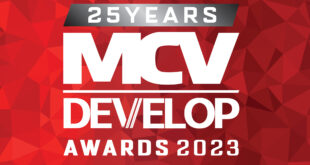
We’d hardly be the first to point out that the past few years have been a hugely transformational time. As (at the time of writing) we ‘celebrate’ the two-year anniversary of the first lockdown in the UK, it’s hard not to look back on how drastically our industry, and the world at large, has changed.
Of course, most of the changes of the past few years have been profoundly negative, at least outside of the industry. And while we’ve learned of (or been reminded of) a number of issues that continue to plague our industry, games are at least in the privileged position of seeing more commercial success and wider cultural acceptance than ever before.
How much of this growing acceptance comes from multiple lockdowns boosting consumer appetites for gaming, and how much is just the inevitable consequence of a shifting cultural attitude around games is a debate best left to another day. Or never, in fact. Don’t email me.
But with the spotlight on the industry more than ever, the industry has a responsibility to not only provide much-needed support on the business side, but also to effectively communicate the potential of games to a rapidly growing consumer audience.
It’s in this spirit that BAFTA, itself going through a transformation with the upcoming departures of CEO Amanda Berry (stepping down in 2023) and COO Kevin Price (leaving in September 2022), has appointed a familiar face as their new head of games – Luke Hebblethwaite.
Many of you are likely already familiar with Hebblethwaite, who spent over five years at Ukie as their insight and innovation manager, with experience working on the UK Games Industry Census, the UK Games Map and Ukie’s annual Consumer Games Market Valuation, among other things.
As we stand on what feels like a tipping point for the industry, it’s an encouraging sign to have BAFTA’s gaming efforts spearheaded by someone with the kinds of hands-on experience and an understanding of the market that comes from half a decade at Ukie.
“BAFTA is making the decision to double down on its efforts in games, and recognises that games deserve to stand shoulder to shoulder with everything in the film and TV world in terms of the craft and the art of creating games,” says Hebblethwaite.
“I think BAFTA has taken a look at its work over the last few years and taken the decision to refocus on games again, as much as it did 20 years ago when it started having its own independent games awards for the first time. This has been another moment of reflection, to point ahead of games and steer that change to modernise BAFTA’s engagement with the industry, its engagement with the public. To speak to that modern industry, an industry that is ever changing, ever growing new technologies, new crafts, new job types, and an ever changing workforce as well.
“You know, we see in the data that we see about the games industry workforce – look at the Ukie census and the data in there (see p32), you know, it speaks to a whole range of people that work within the game sector. BAFTA’s role as a charity in that sector is supporting and nurturing talent, and giving people the opportunity to achieve the best things they can achieve, to create great content and great games. It’s our role to support, grow and then champion those people when they become the heroes of their day.”
FROM UKIE TO BAFTA
And as BAFTA has that moment of reflection, they’ll be sure to make good use of their new head of games’ experience in the sector.
“I think the head of games role is providing two things,” says Hebblethwaite. “One, it’s a catalyst for BAFTA to focus its efforts around. It’s someone who can open those doors and get those things moving, that otherwise might have been a bit trickier.
“But it’s also about bringing that insight about where our efforts are best targeted. To understand the kinds of industry issues that are happening right now, and the direction of where the industry is going. It’s to understand, to some extent, the games audience – although I’m a little older than much of the games audience, it evolves faster than I can! But that’s the exciting part, it’s an industry where you’ve got to adapt. Any industry issue, any new technology, the way we talk about games… You know, in five years time we’ll be talking about something completely different, the industry will have moved on.
“So I think having my experience at Ukie, having dealt with an environment very much like that, is super helpful and really sort of critical to change the way of working here. Not in the sense that we were ever not delivering things of value, but the need to constantly adapt and grow as the industry develops.”
The appointment is certainly well-timed too. It’s all well and good to celebrate the successes of the industry, as we reap the benefits of this period of growth. But with that success comes increased attention, and a reminder of our responsibilities as an industry – especially in our need to diversify, as highlighted in the recent Ukie census.
“I think as the industry’s matured over the last 5-10 years or so, the conversations the industry’s been having with itself have become very different. I think as businesses become ever-larger, they start to live in the real world a little bit more, rather than being this industry that was off doing its own thing.
“As the industry steps into the limelight in a cultural way, it’s coming to understand that it comes with a lot of responsibility and that, as a globally active industry producing content for people all over the world, that the people who create that content are essential. If everyone at your company thinks the same way, it’s going to be much harder for you to create content for people who aren’t like you. I think businesses are understanding that. BAFTA is here to help celebrate that and celebrate where games achieve new things, break new ground and tell new stories.”
BLACK TWITCH UK
That need for further diversity brings us nicely to BAFTA’s partnership with Black Twitch UK, a platform that promotes the voices and content of black streamers and content creators in the UK. Taking place on the 31st of March, the partnership saw the inaugural ‘BAFTA Games Challenge, in which two teams of six women from Black Twitch UK competed live on BAFTA’s Twitch in a series of challenges celebrating six of this year’s BAFTA-nominated games.
“This event is an opportunity for BAFTA to partner with an organisation like Black Twitch UK, that does a lot of great work in supporting and helping to champion and grow streamers from underrepresented backgrounds. Helping them to find their audiences and give them a voice.
“And I think for us – BAFTA’s not done a lot of streaming events before, and we’re trying things out. I think it’s really important that BAFTA’s role and the way it talks about the games industry has to be reflective of the activities that are happening in the industry – you can’t do the same ways of talking about games as we do for TV and film. So we have to meet the games industry audience and we have to participate, as much as we have to be thought leaders in that. And I think, across all of that, we want this to be a fun event. Ultimately, it’s two and a half hours of people having a laugh, but it’s also there to try and think about games in different ways. Also it’s about supporting the streaming sector and the diversity of people in that, as we would across any other parts of the industry.”
BAFTA CREW
So what about BAFTA’s future? What can we expect to see as the industry continues to mature and grow during this transformational time? What level of support will BAFTA provide to the games leaders of the future?
“BAFTA Games has been a little quiet over the last few years, so it’s time to revitalise that programme,” says Hebblethwaite. “And as part of that, we’re changing the way we work. A good example of that is in the new tier of membership called Connect. It’s an evolution of what we used to call BAFTA Crew, which has been a long-running programme.
“That initiative was kind of running to the limits of what we could sustain as a separate initiative, so now it’s evolved into a new tier of membership. The point of that membership is it brings those people much closer into the main BAFTA network. So they’re going to have access to the same events and opportunities that our full members would have, but also they’re getting that extra support and community work that the Crew had as well.
“So we’re looking at like a full day conference for them about games, we’re looking at a bespoke programme for more early career activities that might not be so relevant to the full BAFTA members. That’s one of those areas that we’ve thought a lot about and adapted. Of course, it fits into TV and film as well, but I think it’s a real opportunity for games to give people in those early roles some really good opportunities, to give them a boost in their careers.
“It’s a really exciting evolution and ultimately, as we deliver more events, I obviously want more people to join. I want to see a thousand members in the games industry in the next year or two. But in doing that, of course, we need to make sure that, even though we’re a charity and every member really is supporting the work we do as a whole, we also need to make sure that those members are getting something back. You can’t do one without the other. It’s about making sure that we’re committing to delivering, and making sure that people are getting a return on their investment into BAFTA, the trust they placed in us by becoming members.”
LOOKING AHEAD
As he settles into his new role and (at the time of our interview) looks forward to the BAFTA Games Awards, Hebblethwaite takes a moment to reflect on the passion the charity has for the game sector, and its potential to do important work for the industry.
“I can see the sheer amount of hard work and professionalism that goes into creating these awards, and the care that’s gone into things like accessibility, how we get people around the venues, the kinds of adaptations that are made to help support people. I’m really pleased to see that kind of thinking.
“I was lucky enough to work at the film awards, and you can see that it’s the same level of care for games as well. I’m hugely excited about the awards, it’s great to be back in real life and to take time to celebrate the games industry and to celebrate the craft and the art.
“This is a moment of cultural recognition for games, and BAFTA is one of the few organisations that can do it like this. I think that’s really important, and it’s something the industry can be proud of. And we couldn’t do it without the support of our members, whether that’s full members, Connect members, or whether it’s our industry partners who also support us.
“My message to people is to get involved: if you want to become a BAFTA member, talk to us. If you’ve got ideas about how BAFTA can change for the future, come and talk to us. This is a changing time for the industry, and I’m all ears to what that should look like. I’ve got my ideas, but there’s a lot of great ideas out there. If you think there’s things we should be doing, or things we shouldn’t be doing, get in touch and let’s work on this together.
“If you’re a BAFTA member, get involved, turn up to events. You’ll get out what you put in. I think for me, this is the time to help us shape the industry. I think as an arts charity, it’s our role to make sure that we’re talking responsibly about the industry. We’re doing this to support the up and coming talent from all walks of life within that.”

 MCV/DEVELOP News, events, research and jobs from the games industry
MCV/DEVELOP News, events, research and jobs from the games industry




